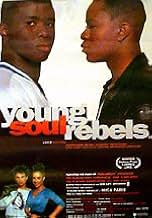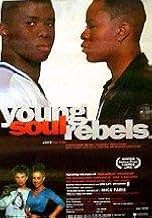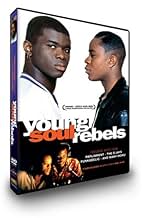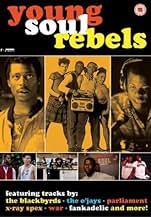Agrega una trama en tu idiomaTwo disc jockeys have a friend's murder to solve in the fringe-group melting pot of 1977 London.Two disc jockeys have a friend's murder to solve in the fringe-group melting pot of 1977 London.Two disc jockeys have a friend's murder to solve in the fringe-group melting pot of 1977 London.
- Dirección
- Guionistas
- Elenco
- Premios
- 1 premio ganado en total
Eamonn Walker
- Carlton
- (as Eamon Walker)
- Dirección
- Guionistas
- Todo el elenco y el equipo
- Producción, taquilla y más en IMDbPro
Opiniones destacadas
I am currently writing a paper on this film and another for one of my film classes, Topics in National Cinemas, as it was one of the films we examined. While perusing this page for certain information I needed i happened to read the previous comment that someone had posted regarding what they thought of the film.
While reading this individual's comments it occurred to me that they COMPLETELY misunderstood the film and what it set out to challenge and address. This film is NOT a murder mystery. Yes, a murder occurs and sets off the story, but it is no more essential to the plot than is the youth in a coma in La Haine (Kassovitz, 1995). Like La Haine, this film sets out to address social issues pertaining to race, class, positioning in the political landscape, and, unlike La Haine, sexuality (which seemed to greatly disturb the previous individual who posted).
Young Soul Rebels examines the social landscape of late 1970s Britain, and particularly how it affects youths within the greatly marginalized "Black" culture. It confronts issues of diaspora, through the juxtaposition of different aspects of the "Black" culture, as in the rastas working at the garage, compared with the two, funk obsessed (and much more "Afro-English") main characters. It also looks at the intersection at which certain sub-cultural borders collide, as in the Punks, the Funks, and the Reggaes, as well as Hetero and Homosexuality. Ultimately this notion of collision is key to understanding this film for what it is, which is precisely identities in collision. If the previous individual who posted had understood this, then they would have also seen how the murderer's motives implied this idea of identity collision, were driven by it and pertained more to it than to reading the film as a simple "whodunnit." In this light, you'll also find that music drives the film, both as a signifier for identities, and as an expression of them. Music is certainly an essential component to this film.
For more information regarding the issues this film juggles, and for a greater understanding of its concepts and meanings, look at the writings of Paul Gilroy, particularly his book "Ain't No Black in the Union Jack," and the film's director, Isaac Julien.
While reading this individual's comments it occurred to me that they COMPLETELY misunderstood the film and what it set out to challenge and address. This film is NOT a murder mystery. Yes, a murder occurs and sets off the story, but it is no more essential to the plot than is the youth in a coma in La Haine (Kassovitz, 1995). Like La Haine, this film sets out to address social issues pertaining to race, class, positioning in the political landscape, and, unlike La Haine, sexuality (which seemed to greatly disturb the previous individual who posted).
Young Soul Rebels examines the social landscape of late 1970s Britain, and particularly how it affects youths within the greatly marginalized "Black" culture. It confronts issues of diaspora, through the juxtaposition of different aspects of the "Black" culture, as in the rastas working at the garage, compared with the two, funk obsessed (and much more "Afro-English") main characters. It also looks at the intersection at which certain sub-cultural borders collide, as in the Punks, the Funks, and the Reggaes, as well as Hetero and Homosexuality. Ultimately this notion of collision is key to understanding this film for what it is, which is precisely identities in collision. If the previous individual who posted had understood this, then they would have also seen how the murderer's motives implied this idea of identity collision, were driven by it and pertained more to it than to reading the film as a simple "whodunnit." In this light, you'll also find that music drives the film, both as a signifier for identities, and as an expression of them. Music is certainly an essential component to this film.
For more information regarding the issues this film juggles, and for a greater understanding of its concepts and meanings, look at the writings of Paul Gilroy, particularly his book "Ain't No Black in the Union Jack," and the film's director, Isaac Julien.
My review was written in May 1991 after a screening in the International Critics Week section of the Cannes Film Festival.
Too many ingredients are mixed in the stew of Isaac Julien's debut pic "Young Soul Rebels", an intermittently entertaining saga of countercultures in 1977 London.
Picture's London black milieu and murder mystery plotlines recall the classic Janet Green-scripted "Sapphire" over 30 years ago, but Julien keeps digressing from the main story to cover interesting yet tangential topics.
Theme, hammered away between musical or romantic interludes, concerns many forms of intolerance and stereotyping. Blacks and gays are the key protagonists, while ohter subgrps liek punks , soul music fans in Britain, half-castes (a theme echoing "Sapphire") and even Scottish nationalists are given attention.
Chris (Valentine Nonyela) and Caz (Mo Sesay) are two fledgling deejays broadcasting from the pirate radio station WEFUNK a form of black-oriented disco music. Their friend Terry James is murdered by a white man during a homosexual tryst in the park. Chris accidentally obtains an audio tape of the murder from TJ's boombox.
Chris halfheartedly tries to break into the mainstream via Metropolitan radio station, where he meets and romances a beautiful production assistant Tracy (Sophie Okonedo). Caz is revealed to be gay, and splits from his long-time partner to take up with a punk-styled white deejay Billibud (James Durr).
With Queen Elizabeth's Silver Jubilee as a backdrop (and target for frequent satire of the establishment) pic establishes its thriller credentials at the outset but is poorly paced. Director Julien's inclusion of homoserotic love scenes is no longer a cinematic novelty, yet their placement distracts from the main narrative (especially a lengthy bed scene of Caz and Billibud late in the film).
Styling of aggressively androgynous Valentine Nonyela in the central hetrerosexual role misleads rather than adds to the film's relentless attack on stereotypes.
Pic's most successful element is Nina Kellgren's high-contrast lighting that gives it a modern, futuristic look. Nostalgia content is covered by disco-era music ranging from Roy Ayers to War plus dancing to match. After the most obvious murder suspect is identified and in lame duck fashion disposed of, Julien adds a friendly ensemble dance scene for closure that doesn't ring true.
Young cast is attractive and enthusiastic and Frances Barber guests in a droll turn as Chirs' free =psirited white mom. Frequent male crotch (clothed) closeups a la Pasolini and the homosexual mileu should limit as well as define the film's potential audience. Some thick accents (French subtitles at Cannes definitely helped comprehension) are a drawback to Stateside acceptance.
Too many ingredients are mixed in the stew of Isaac Julien's debut pic "Young Soul Rebels", an intermittently entertaining saga of countercultures in 1977 London.
Picture's London black milieu and murder mystery plotlines recall the classic Janet Green-scripted "Sapphire" over 30 years ago, but Julien keeps digressing from the main story to cover interesting yet tangential topics.
Theme, hammered away between musical or romantic interludes, concerns many forms of intolerance and stereotyping. Blacks and gays are the key protagonists, while ohter subgrps liek punks , soul music fans in Britain, half-castes (a theme echoing "Sapphire") and even Scottish nationalists are given attention.
Chris (Valentine Nonyela) and Caz (Mo Sesay) are two fledgling deejays broadcasting from the pirate radio station WEFUNK a form of black-oriented disco music. Their friend Terry James is murdered by a white man during a homosexual tryst in the park. Chris accidentally obtains an audio tape of the murder from TJ's boombox.
Chris halfheartedly tries to break into the mainstream via Metropolitan radio station, where he meets and romances a beautiful production assistant Tracy (Sophie Okonedo). Caz is revealed to be gay, and splits from his long-time partner to take up with a punk-styled white deejay Billibud (James Durr).
With Queen Elizabeth's Silver Jubilee as a backdrop (and target for frequent satire of the establishment) pic establishes its thriller credentials at the outset but is poorly paced. Director Julien's inclusion of homoserotic love scenes is no longer a cinematic novelty, yet their placement distracts from the main narrative (especially a lengthy bed scene of Caz and Billibud late in the film).
Styling of aggressively androgynous Valentine Nonyela in the central hetrerosexual role misleads rather than adds to the film's relentless attack on stereotypes.
Pic's most successful element is Nina Kellgren's high-contrast lighting that gives it a modern, futuristic look. Nostalgia content is covered by disco-era music ranging from Roy Ayers to War plus dancing to match. After the most obvious murder suspect is identified and in lame duck fashion disposed of, Julien adds a friendly ensemble dance scene for closure that doesn't ring true.
Young cast is attractive and enthusiastic and Frances Barber guests in a droll turn as Chirs' free =psirited white mom. Frequent male crotch (clothed) closeups a la Pasolini and the homosexual mileu should limit as well as define the film's potential audience. Some thick accents (French subtitles at Cannes definitely helped comprehension) are a drawback to Stateside acceptance.
I saw this film shortly after it's release, and felt quite cheated. It's title and advertising gave me the impression that it would be about the black DJ sound systems and soul scene which was at it's height in England during the late '70s and early '80s. But this only took up a fraction of film time. Instead, I had to sit through a convoluted sub-plot featuring a murder mystery which appeared all of a sudden during the movie, a very gratuitous gay sex scene, and generally bad acting and direction. There were a few moments where the protagonists had brushes with the law, and I thought at last this film was going somewhere and would depict the racism of the justice system accurately. But this was not the case, and these scenes appeared to have been either badly written, or edited. And when one character deceides to carry out his own murder investigation, I found it laughable. I understand that no film can be 100% accurate when depicting an era or events around it, and that it should be entertaining to the viewer. But at least a good attempt should be made to get the basics right. For example, hardly any of the black male actors sported an afro hairstyle or wore flares, which would have been as common as a rainy day in London during 1977. Blacks mixing with Punks? I'm no sure about that. They would have considered a lot of Punks to be similar to the skinheads which carried out a lot of racist attacks at that time. Also another sex scene featuring Sophie Okenedo and Valentine Nonyela, was not handled well at all, and was certainly not as explicit as the previous gay sex scenes which says a lot about it's director. By trying to show that homosexuality in the black british community is opposed more than in the white, I feel is absolute nonsense. Homophobia has no colour preference, and being black, it's director Isaac Julien should know better really.
Been a long time since I saw this movie, but whenever I think of it, or even just hear that song from the soundtrack, I feel all happy and <ahem> gay. Funny thing is, I went back to see what I'd noted about it at the time (1991), and apparently I'd only considered it a so-so film!
So, yes, perhaps the story line was a bit flimsy, perhaps all of the movie didnt amount to a whole much ... but if the memory of it still makes me smile after ten years, it must've been a lot better than I'd originally realised! ;-)
So, yes, perhaps the story line was a bit flimsy, perhaps all of the movie didnt amount to a whole much ... but if the memory of it still makes me smile after ten years, it must've been a lot better than I'd originally realised! ;-)
Unfortunately by choosing to set the film in such a specific time it has lost relevance. Added to the utterly clunky script and the dire and wooden acting it makes me wonder if and how the film ever was a success.
The murder angle was a complete mystery to me. Why did it happen? How come the victim didn't recognise the killer? That the murder and its (sort of) solving framed the film seemed totally extraneous. Why didn't Chris also get murdered?
Between this we got a disconnected story of a couple of black lads one of whom was openly gay and seemingly not getting stick for it on his rough council estate.
Lovemaking scenes - both gay and straight ones - were vastly unconvincing especially between Caz and his new punk amour. After this latter all I could think was "Was that all?".
I watched this because of an article in the Guardian detailing the "20 Best LGB Films". A couple of the choices on the list surprised me and I didn't think they deserved to be there. Nor does this dreadful effort either.
The murder angle was a complete mystery to me. Why did it happen? How come the victim didn't recognise the killer? That the murder and its (sort of) solving framed the film seemed totally extraneous. Why didn't Chris also get murdered?
Between this we got a disconnected story of a couple of black lads one of whom was openly gay and seemingly not getting stick for it on his rough council estate.
Lovemaking scenes - both gay and straight ones - were vastly unconvincing especially between Caz and his new punk amour. After this latter all I could think was "Was that all?".
I watched this because of an article in the Guardian detailing the "20 Best LGB Films". A couple of the choices on the list surprised me and I didn't think they deserved to be there. Nor does this dreadful effort either.
¿Sabías que…?
- TriviaThe film takes place in 1977.
- ErroresThe two punk bands GBH and Conflict weren't around in 1977.
- ConexionesFeatured in Queerama (2017)
- Bandas sonorasP. Funk Wants To Get Funked Up
Performed by Parliament
Licensed Courtesy of Casablanca Records Inc/Polygram Records Inc (New York)
Selecciones populares
Inicia sesión para calificar y agrega a la lista de videos para obtener recomendaciones personalizadas
- How long is Young Soul Rebels?Con tecnología de Alexa
Detalles
Taquilla
- Total en EE. UU. y Canadá
- USD 225,664
- Fin de semana de estreno en EE. UU. y Canadá
- USD 2,609
- 24 nov 1991
- Total a nivel mundial
- USD 225,664
Contribuir a esta página
Sugiere una edición o agrega el contenido que falta

Principales brechas de datos
By what name was Young Soul Rebels (1991) officially released in India in English?
Responda


























